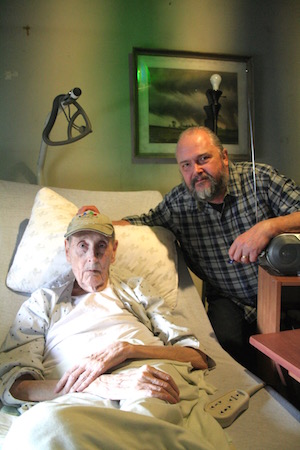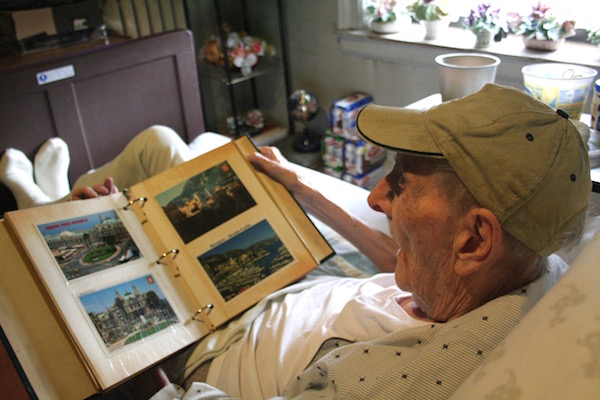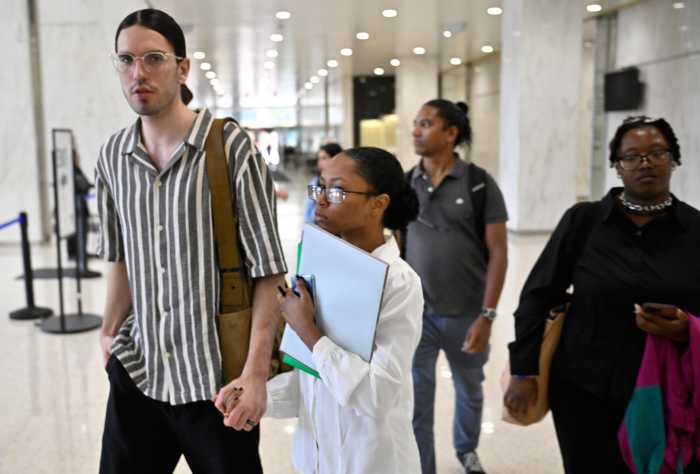
BY COLIN MIXSON | Until recently, longtime Chelsea resident Malcolm LaPrade lived what many would consider the good life. He made millions in the stock market, and spent it in the pursuit of pleasure — which, in his case, meant worldwide travel.
LaPrade’s small one bedroom apartment on W. 16th St. is stuffed with the novelty relics of innumerable far-flung adventures. His shelves are lined with delicate flowers of Italian porcelain. Scattered across the floor, gemstone seas gleam off a dozen bejeweled globes. Stuffed behind his television, there’s a bookshelf brimming with meticulously curated photo albums, which feature thousands of snapshots and postcards from exotic locales across Europe, along with many tropical islands and the luxurious cruises that bore him there.
Taken as a whole, the splendid knickknacks and posh mementos tell the story of a man who was not overly concerned with saving his money — preferring instead to enjoy it.
“He was a little extravagant with his spending,” said Paul Groncki, LaPrade’s friend and neighbor.
These days, however, LaPrade doesn’t do much traveling. In fact, he doesn’t move much at all. At 85 years old, his wanderlust been quelled by a terrible affliction of the knee, which has left him bedridden and in constant need of care. More than that, it’s left him broke. The cost of a lifetime of travel, it would seem, is nothing compared to a few medical bills paid out of pocket.
“I was a millionaire a year ago,” said LaPrade, “and that’s how much I spent on three round-the-clock nurses.”
LaPrade’s career as a self-employed stockbroker left him with great wealth, but no security. He had no savings plan and little in the way of social security. In fact, things would still be very bleak for the ailing jet-setter if not for one thing: He was a war veteran.
LaPrade never saw combat. He did, however, serve during a war. As a young man, he was drafted amidst the Korean War into the army on Aug. 10, 1951. He received his basic training at Fort Dix, NJ, before Uncle Sam sent him to Baltimore, where he was trained for intelligence work.
From there he was sent to Munich, Germany, where he was responsible for editing intelligence reports sent in from American agents concerning the activity of the Soviet Union and its spies. LaPrade called the work “thrilling,” and “extremely interesting,” even though “most of it was nonsense. The Russians were not doing very much, despite the fact that we were wasting our time being terribly worried about them.”
He served for two years, and, once his term was up, he set sail back for the States, began his career, and didn’t think too much about his wartime service — until last summer.
Broke and living off a social security pension of $620 a month, LaPrade reached out in desperation to Groncki, who eventually would come to assume power of attorney over his ailing neighbor and, more importantly, started making phone calls to local elected officials — including City Councilmember Corey Johnson, whose area of representation includes Chelsea.
Johnson reached out to Councilmember Eric Ulrich, chair of the Committee on Veterans, who in turn made a call to David Michael Falcon, a staff attorney at the New York Legal Assistance Group (nylag.org), working on the Veterans Assistance Project.
After meeting with LaPrade and discussing the details of his service in the army, Falcon discovered that the ailing veteran — thanks to his wartime service — was eligible for state aid through an obscure act of Congress referred to as the Non-Service Connected Disability Pension.

With that, LaPrade began receiving an additional $1,100 on top of his social security. In addition to other aid Groncki was able to secure, including food stamps and a reduction on his electric bill, LaPrade has been able to continue living at his home.
“If we couldn’t have found that $1,100 in his veterans pension, we wouldn’t be sitting down here today,” Groncki said. “I don’t know where he’d be. I know enough about caring for the aged [by caring for my own family] to know it’s less expensive to help someone survive at home than it is in ‘a home,’ and we really wanted to keep him here.”
But what really surprised LaPrade and his de-facto benefactor, Groncki, was that they’d already been to the US Department of Veterans Affairs (VA), and nobody had ever mentioned anything about a wartime veterans assistance program.
“The VA don’t know anything about the other social benefits,” he said. “And that is a problem.”
According to Falcon, the problem is especially acute among older veterans.

“I’m seeing a split right now, so anyone from World War II, Korea, or Vietnam are somewhat oblivious to this,” said Falcon. “We’re finding that they’re just kind of oblivious that these benefits exist and of the process for acquiring them.”
Thanks to Falcon, and his acute understanding of the benefits afforded to veterans such as LaPrade, the indisposed counterintelligence officer can spend his final years in the relative comfort of his own home. And, certainly, without his help, LaPrade and his neighbor would have had to fall back on a Plan B of dubious value: selling the Italian porcelain.
“There may be gems in here, but the taste for Italian porcelain is not current,” said Groncki. “I don’t think we could have gotten very much.”






























